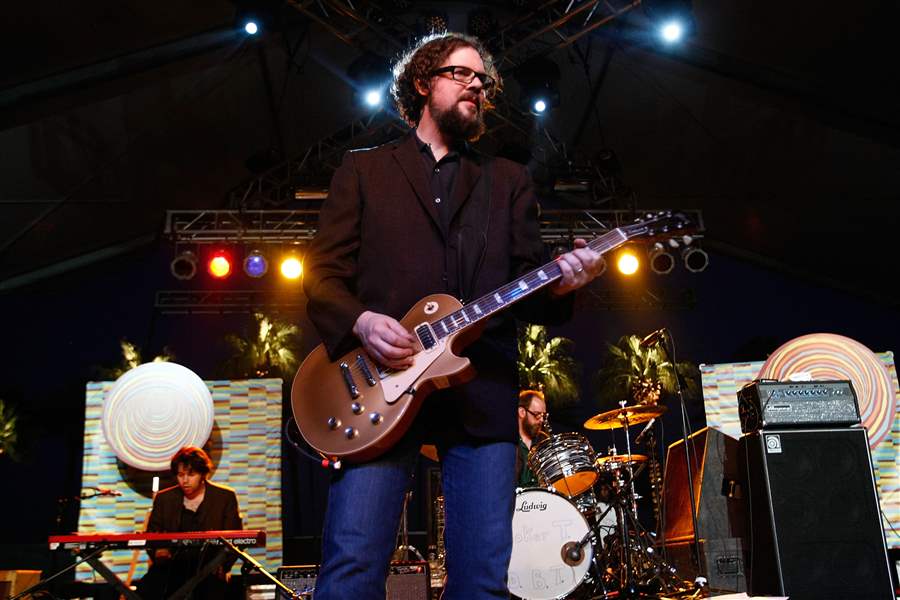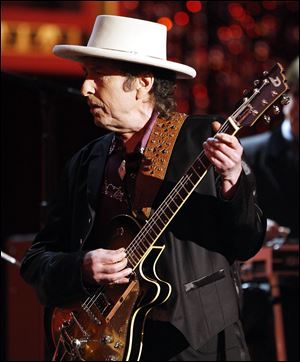
ALBUM REVIEWS
Patterson Hood, Bob Dylan celebrate new releases
9/13/2012
Musician Patterson Hood
Getty Images

Musician Patterson Hood
HEAT LIGHTNING RUMBLES IN THE DISTANCE
Patterson Hood (ATO)
Patterson Hood has always brought a novelist's eye for detail and a sense of economy to his work as one of the principle songwriters for the Drive-By Truckers, but on his third solo release he ups the creative ante considerably.
It's no accident that "Heat Lighting" started off as part of a novel -- Hood intended to revisit a particular turbulent period of his life, fictionalize it, and write songs to accompany each chapter -- because the lyrics bring a level of detail and nuance that are both remarkable and instantly accessible.
There are characters -- the fictional Billy Ringo, an unhinged lover, the real Vic Chesnutt -- a strong sense of place -- angry bedrooms, old homesteads, the insides of cars -- and palpable emotions.
Just one example is the character sketch that starts the beautiful, aching ballad "Come Back Little Star": Heaven blue eyes/Those long black lashes/Razor tongue and southern drawl/Pouring out like molasses/That trail of silver mercury/To show us all what you've seen/You always have a drink in your hand/But your liver ain't what it used to be.
The song, with accompaniment by Kelly Hogan on vocals is about Chesnutt, the late Athens, Ga., songwriter with whom Hood was friends. But it could be about your brother or your nephew or your son or anyone whose hard living sent them to the grave much too soon.
Hood tackles conflicting themes throughout the disc and knits them together with music that is generally complex and quiet, never approaching the full-band guitar army roar that marks the best of the Truckers. Songs about mortally broken relationships sit next to odes like the title track that explore the sublime joys of a healthy marriage where the narrator "stands strong beside you."
The result is a disc that grows and evolves on each listen as Hood takes you on his personal journey and finds the universal themes that anyone who has suffered and survived a stronger person can understand and appreciate.
The closest antecedent artistically is Neil Young, especially on the gut-wrenching "After the Damage" and the cautionary addiction-warning "Betty Ford," but also on the happier songs that zero in on domestic bliss and point the singer -- and the listener -- forward to better times.
-- ROD LOCKWOOD

Bob Dylan
TEMPEST
Bob Dylan (Columbia)
"Tempest" is no doubt the best album you'll ever hear from a 71-year-old.
If that sounds like damning Bob Dylan with faint praise, rest assured this is one of the best discs you'll hear by anyone this year, at any age. Rather, the point is made to marvel at the vitality of a man who's been making albums for 50 years and still manages to be relevant.
Bob Dylan has led his fans, and the entire music community, on many journeys over a half century, even a few dead ends. After a detour with 2009's largely unsatisfying "Together Through Life," the new "Tempest" continues the improbable late-career renaissance of America's greatest living songwriter.
The title cut is the centerpiece, a Celtic-flavored telling of the Titanic story, both historically accurate and fanciful. Its 45 verses -- no chorus, no bridge -- even reference Leonardo DiCaprio. The cinematic look at all manners of behavior in the face of impending doom stretches on for 14 minutes. A watchman who missed the trouble ahead is an indelible, recurring character.
"Tempest" is not even the first epic on the record. "Tin Angel" is an old-fashioned murder ballad, a bloody tale of a tragic love triangle that advances on a rubbery and ominous bass line by Tony Garnier, Dylan's bass player for more than 20 years and 2,000 concerts.
That bass line is an example of the musical signature of the disc -- arrangements that create momentum through repetition. On "Long and Wasted Years," it's a descending guitar lick. The hook on "Narrow Way" rocks hard. The pedestrian blues of "Early Roman Kings" shows that approach doesn't work every time but otherwise, the effect is mesmerizing and directs attention straight to the lyrics. Dylan's voice is a guttural growl now, that's no secret, but he knows how to enunciate and sing. None of the words passes by unnoticed.
There's plenty to be engrossed by. Serious study would take a New Yorker-length article, when one song alone has more verses than most modern albums. Dylan shows quite a violent streak, with one song's key line being "I pay in blood, but not my own." The lovely tribute to John Lennon begins with his murder.
Dylan is an American musicologist, and the variety of styles on "Tempest" adds to the enjoyment. The opening "Duquesne Whistle" swings. "Soon After Midnight" is a love song led by pedal steel guitar. "Pay in Blood" mixes the pedal steel with a soulful backbeat and "Roll on John" has a stately, weary gait that matches the subject matter.
Decades ago, Dylan's characters, allusions, and turns of phrases were the subject of academic study. That this inscrutable lyricist can continue to amaze, amuse, befuddle, and bedazzle past retirement age is something to behold.
Nobody makes discs like this anymore.
-- DAVID BAUDER, Associated Press